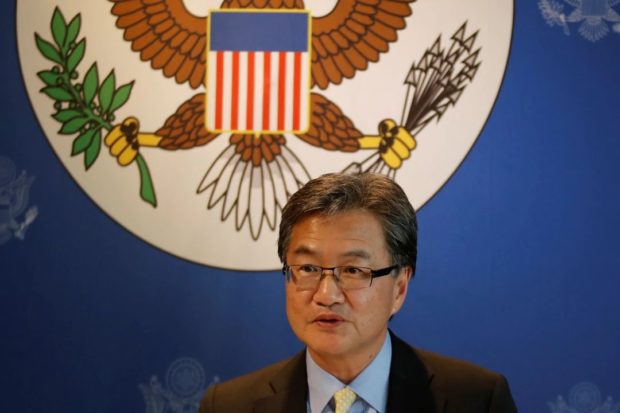To counter China influence, US names envoy to lead Pacific Island talks

U.S. Special Representative for North Korea Policy Joseph Yun arrives at a meeting with the media in Bangkok, Thailand December 15, 2017. REUTERS
WASHINGTON — The United States on Tuesday named former senior diplomat Joseph Yun to lead languishing talks with three tiny but strategically important Pacific Island countries, a signal that countering China remains a U.S. priority despite Russia’s war in Ukraine.
The State Department confirmed the appointment of Yun, who served as U.S. special envoy for North Korea under former U.S. presidents Barack Obama and Donald Trump, in response to queries from Reuters.
“In light of the critical nature of these complex negotiations, President Biden is appointing Ambassador Joseph Yun as Special Presidential Envoy for Compact Negotiations,” a statement from the department said.
“We are currently engaged in negotiating amendments to certain provisions of the Compacts of Free Association with the FAS, and completing the negotiations is a priority for this Administration,” the statement said, referring to the islands collectively called the Freely Associated States.
The COFA negotiations govern U.S. economic assistance for the Republic of the Marshall Islands (RMI), the Federated States of Micronesia (FSM), and Palau.
Article continues after this advertisementProvisions in the compacts are set to expire in 2023 for the first countries and in 2024 for Palau. Renewal talks began during the Trump administration, but sources familiar with the process say there have been no substantive engagements with U.S. officials since December 2020.
Article continues after this advertisementChina, meanwhile, has made economic overtures to the Pacific Islands countries focusing on tourism and trade and appears keen to establish a military foothold in the region.
The RMI’s ambassador to Washington told Reuters in February talks had stalled because of the U.S. failure to appoint a negotiator authorized by President Joe Biden to discuss key issues, including remuneration for the legacy of massive U.S. nuclear testing on the islands, the presence U.S. military bases, and climate-change mitigation.
On Tuesday, the ambassador, Gerald Zackios, told Reuters the RMI welcomed Yun’s appointment, “and looks forward to the resumption of these important discussions.”
He said the RMI was keen to discuss key priorities, including economic, nuclear and climate issues and the Kwajalein Atoll, which is home to a U.S. ballistic missile test site.
Yun, who handled highly sensitive negotiations over North Korea’s nuclear weapons programs, should help resolve that impasse.
“I look forward to working with our FAS partners to make the relationship even better going forward,” he told Reuters, adding that he was “honored” to be given the responsibility.
Since leaving government, Yun has worked as an adviser to the Asia Group, a business consultancy set up by Kurt Campbell, the White House policy coordinator for the Indo-Pacific.
Critics say delays in renewing provisions in the compacts are a significant lapse given China’s efforts to make economic inroads in three countries that give the United States an unparalleled military foothold in the region.
The RMI and Palau are also among the few remaining states to formally recognize Taiwan diplomatically rather than Beijing, while the FSM has relations with China and has joined its Belt and Road Initiative, a global scheme through which Beijing has sought to extend its influence with infrastructure and other investments.
U.S. officials have said they are confident Russia’s actions in Ukraine will not divert from U.S. Indo-Pacific goals, but experts note that past geopolitical crises have derailed previous U.S. efforts to refocus on Asia.
“It shows they remain committed to their Indo-Pacific plans despite Ukraine,” a source with knowledge of Yun’s appointment said.
A 2019 Rand Corp report called the FAS “a power projection superhighway running through the heart of the North Pacific into Asia” and said the compacts provide the U.S. military with sole and unfettered access to the islands’ lands, waters and airspace.
But island representatives say financial support has not kept pace with U.S. obligations, particularly given the nuclear legacy in the Marshall Islands, where the U.S. military conducted 67 nuclear weapons tests from 1946 to 1958.
Islanders are still plagued by health and environmental effects, but Washington says all legal claims over the issue were resolved under its previous compact with the country.
RELATED STORIES
U.S. vows stepped up Indo-Pacific effort in push back against China
Blinken with Pacific trip aims to reaffirm US focus on Asia
Australia’s vaccine diplomacy in Pacific islands wards off Beijing—PM Morrison